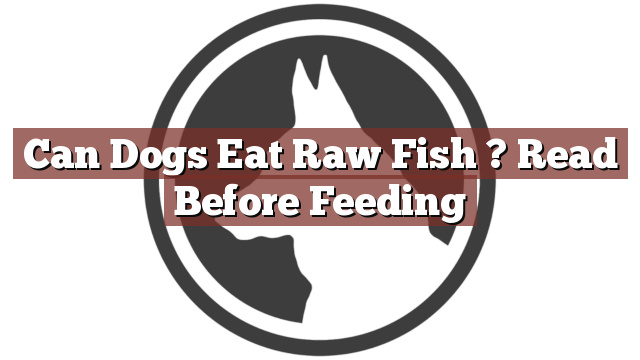Understanding Your Dog’s Dietary Needs
Proper nutrition is essential for the overall health and well-being of our furry friends. As responsible pet owners, it is crucial to understand our dog’s dietary needs to ensure they receive a balanced diet. While dogs are primarily omnivorous, their diet typically consists of meat, vegetables, and grains. However, it is important to note that not all human food is safe for dogs to consume. Before incorporating any new food into their diet, it is important to do thorough research and consult with a veterinarian.
Can Dogs Eat Raw Fish? Read Before Feeding
Can dogs eat raw fish? This is a common question among dog owners who want to introduce fish into their pet’s diet. The answer is yes, dogs can eat raw fish, but certain precautions must be taken. Fish is an excellent source of protein, omega-3 fatty acids, and essential nutrients. It can provide numerous health benefits for your canine companion, such as improved skin and coat health, reduced inflammation, and enhanced immune function.
However, it is important to ensure that the fish you feed your dog is fresh, properly cleaned, and deboned. Raw fish can contain harmful bacteria and parasites that can be detrimental to your dog’s health. To minimize the risk of foodborne illnesses, freezing the fish for a minimum of two weeks before feeding it to your dog can help kill any potential parasites. Additionally, it is crucial to introduce fish gradually into your dog’s diet and monitor for any adverse reactions.
Pros and Cons of Feeding Raw Fish to Your Dog
Feeding raw fish to your dog has its pros and cons, which should be carefully considered before incorporating it into their diet. Some benefits of feeding raw fish include its high protein content, which aids in muscle development and repair. The omega-3 fatty acids present in fish can promote a healthy coat, reduce inflammation, and support brain function.
On the other hand, there are potential risks associated with feeding raw fish to dogs. As mentioned earlier, raw fish can contain harmful bacteria such as salmonella or listeria. These can cause gastrointestinal issues, including vomiting and diarrhea. Additionally, certain fish species may contain high levels of mercury or other toxins, which can be harmful to your dog’s health if consumed in large quantities. It is vital to research the type of fish you plan to feed your dog and choose low-mercury options such as salmon or trout.
Conclusion: Weighing the Benefits and Risks of Raw Fish for Dogs
In conclusion, while dogs can eat raw fish, it is essential to exercise caution and make informed decisions regarding their diet. If you choose to incorporate raw fish into your dog’s meals, ensure it is fresh, properly prepared, and free from bones. Gradually introduce fish into their diet and monitor their response for any adverse reactions. Consult with your veterinarian to determine the best approach for your individual dog’s needs. By taking these precautions, you can provide your furry companion with the potential benefits of raw fish while minimizing the associated risks.
Thank you for taking the time to read through our exploration of [page_title]. As every dog lover knows, our furry friends have unique dietary needs and responses, often varying from one canine to another. This is why it's paramount to approach any changes in their diet with caution and knowledge.
Before introducing any new treats or making alterations to your dog's diet based on our insights, it's crucial to consult with a veterinarian about [page_title]. Their expertise ensures that the choices you make are well-suited to your particular pet's health and well-being.
Even seemingly harmless foods can sometimes lead to allergic reactions or digestive issues, which is why monitoring your dog after introducing any new food item is essential.
The content provided here on [page_title] is crafted with care, thorough research, and a genuine love for dogs. Nevertheless, it serves as a general guideline and should not be considered a substitute for professional veterinary advice.
Always prioritize the expert insights of your veterinarian, and remember that the health and happiness of your furry companion come first.
May your journey with your pet continue to be filled with joy, love, and safe culinary adventures. Happy reading, and even happier snacking for your canine friend!

